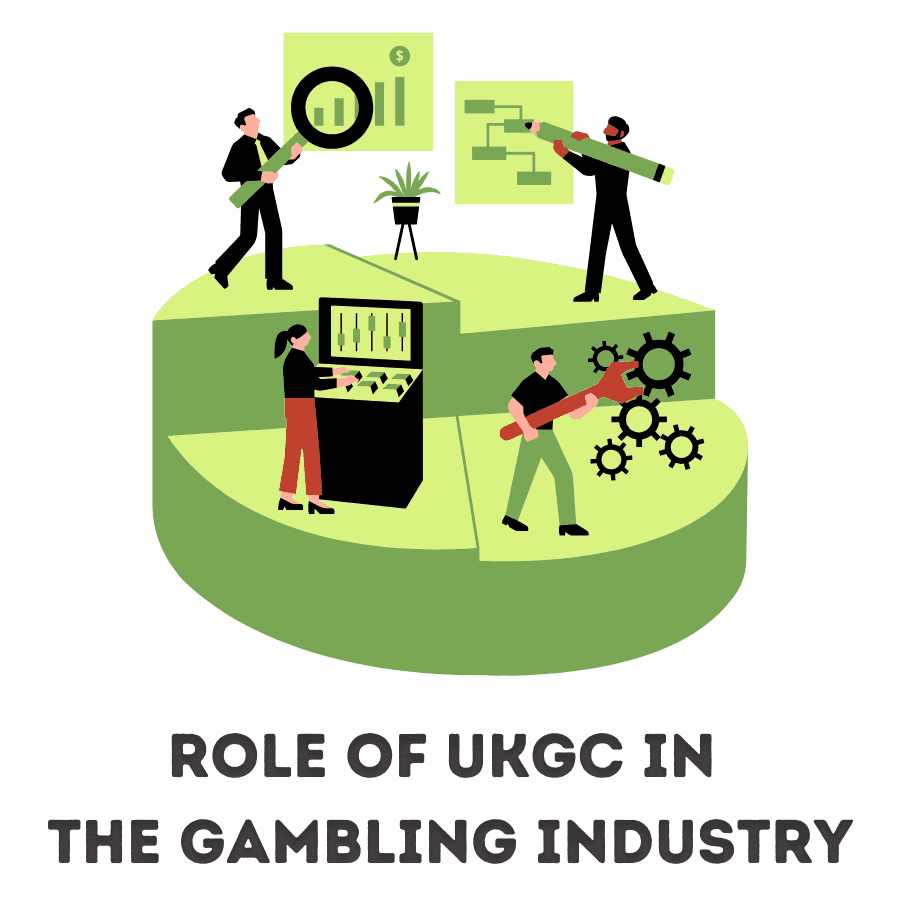Role of UKGC in Regulating the UK Gambling Industry
Updated on:

The gambling regulation in the UK, which was implemented by the United Kingdom Gambling Commission (UKGC), covers digital gaming and betting establishments made accessible to people in the country. The jurisdiction of the UKGC is primarily Great Britain, although it extends to Northern Ireland on certain matters. The types of gambling establishments overseen by the UKGC include online casinos and eSportsbooks.
For this UKGC review and mini-analysis, we will be providing a brief overview of Britain’s Gambling Commission as a regulatory authority of the nation’s gambling industry. We will also be touching on their history and functions. And besides the general facts, we will be recalling some of their most salient accomplishments, plus a major criticism they have had to face.
Contents
Establishment of the UKGC
The UK gambling laws currently being enforced are based on the Gambling Act 2005, which created the Gambling Commission (informally known as the ‘UKGC’). This Act provides for the UKGC’s regulation of Internet-based gambling, along with wagering by telephone or other communication devices, that are offered to Great Britain residents.
The UKGC only oversee gambling platforms to which they’ve issued authorisations, the same remote gaming and betting sites that participate in the UKGC-supported GamStop self-exclusion programme. The UKGC don’t regulate non GamStop bookie and casino sites, so they can’t help Brits complaining about offshore entities that don’t hold UKGC licences.
Regulatory Functions of the UKGC
The gambling regulation in the United Kingdom that’s within the UKGC’s scope includes the licencing of remote operators: those that don’t have land-based or bricks-and-mortar businesses related to wagering. It also entails the strict monitoring of the licence-holders’ commercial activities with respect to protecting player interests. Additionally, it involves the widespread promotion of responsible gambling to prevent addiction to gambling.
- Licencing and Regulation of Gambling Operators
The UKGC have the mandate to issue licences to gambling operators whose businesses are purely conducted over the Internet, landline, mobile phone, or similar communication devices. The UKGC are also responsible for regulating the owners of the licences they issue. - Ensuring Compliance with Laws and Regulations
The UKGC ensure that the licence-holders comply with the laws and policies in the context of the Gambling Act 2005. Their regulatory functions are carried out periodically to see if the operators are consistently abiding by these rules and regulations. - Monitoring and Enforcement Activities
The UKGC closely monitor and inspect the gambling platforms on a regular basis. It’s in their power to revoke the licences of operators who are in violation of the law, and it’s their duty to take legal action against them. - Protection of Players and Prevention of Problem Gambling
Another UKGC function is to block gambling advertisement if this doesn’t follow the rules and regulations pertaining to gambling products and services. Gaming and betting establishments must promote their brands in a socially responsible manner, according to the UK Advertising Codes. - Responsible Gambling Initiatives and Campaigns
Further into the advocacy on responsible gambling, the UKGC directs licence-holders to contribute funds to charities for UK gambling addicts and those at risk of addiction. The not-for-profit organisations that operators must financially support to keep their licences include GambleAware.
Types of Gambling Regulated by UKGC
Under the gambling legislation in the UK at present, the British Gambling Commission oversee various sorts of remote wagering entities and regulates various types of gaming and betting activities. The most common of these are online casinos, virtual bookmakers, and bingo sites. For your quick reference, here’s a list of the kinds of operations under the watch of the UKGC:
- Casinos
- Betting
- Bingo
- Arcades
- Gaming Machine Providers
- The National Lottery
- Gambling Software Providers
- Lottery Operators
How the Gambling Commission Makes Gambling Safer
There are new UK gambling laws to complement existing ones that Britain’s Gambling Commission enforce in the name of safer gaming and betting. Beyond widely promoting responsible gambling amongst individuals, these laws seek to contain the crisis relating to gambling addiction. Currently, about 4.3% of adults in the country are either suffering from problem gambling or are at risk.
Marketing & Advertising
The Gambling Commission UK have the power to compel gaming and betting establishments to market their products and services in accordance with the UK Advertising Codes. Operators must promote their commercial offerings with social responsibility in mind, and they shouldn’t use their adverts to lure underaged people into wagering. The UKGC will take down gambling ads targeting UK youth and heavily penalise the businesses that are caught violating the Codes.
Credit Card Ban
The online gaming and betting regulator in the UK has successfully pushed for the banning of credit card use for gambling. This is in keeping with their commitment to shield wagering enthusiasts and the general public from gambling-related harm. The ban of credit cards in gambling applies to online casinos, virtual bookies, and several other remote establishment types. However, credit cards may be used to buy lottery tickets from shops.
Identity & Age Checks
The UK Gambling Commission impose checks on the identity and age of users of online casinos, bookmaker sites, and other wagering platforms. This makes sure that players and bettors aren’t misrepresenting themselves in any way and that they’re all of legal age. The British regulating body isn’t associated with casinos and bookies that don’t require ID confirmation and verification, nor are they connected with gambling entities that deal with children.
Launch of the National Strategy to Reduce Gambling Harms
The country’s online gambling regulatory authority is at the forefront of conceptualising and executing projects and programmes for the people’s and the industry’s well-being. In 2019, the UKGC launched the National Strategy To Reduce Gambling Harms. Until its end in 2022, the National Strategy served its purpose of educating the public and supporting the afflicted. It also built on the existing practices and policies on the reduction of gambling harm.
GamStop Self-Exclusion
The UKGC’s pursuit of safer gaming for British players and bettors continues with the launch and upkeep of GamStop, the national self-exclusion registry. This scheme, unveiled in 2018, encourages the voluntary participation of gambling fanatics across Great Britain and Northern Ireland. Part of the campaign is to discourage people who try to find way around GamStop by accessing platforms not licenced by the Gambling Commission.
In the GamStop programme, UKGC-regulated operators are required to block registrants from their sites without question. The period of the ban ranges from six (6) months to five (5) years, depending on the registrants’ preference.
Criticism of UKGC
The UK gambling licence is synonymous with prestige and profit. It evokes trustworthiness alongside the readiness to serve the lucrative British gaming and betting community. It would be unfortunate to lose it. Because more than being slapped with Gambling Commission fines that are steep, licence-holders would miss out on being rewarded generously for delighting the £6.6 billion online-wagering industry.
Since their establishment, the UKGC have been seen as hardworking in balancing the industry’s health with that of the wagering public. However, they have been criticised for being so harsh as to give rise to unregulated offshore platforms. It isn’t for them to act otherwise, though, since their mandate is to enforce existing laws vigorously.
